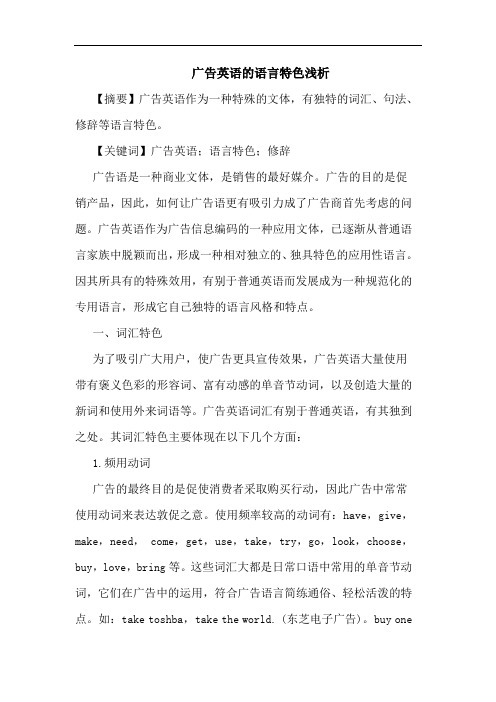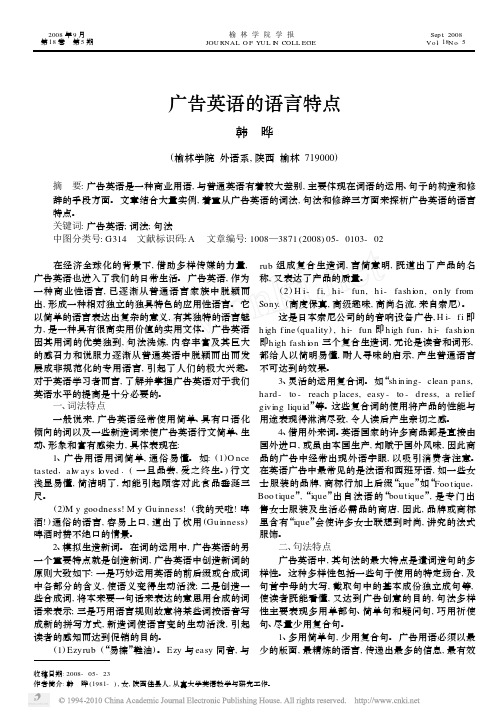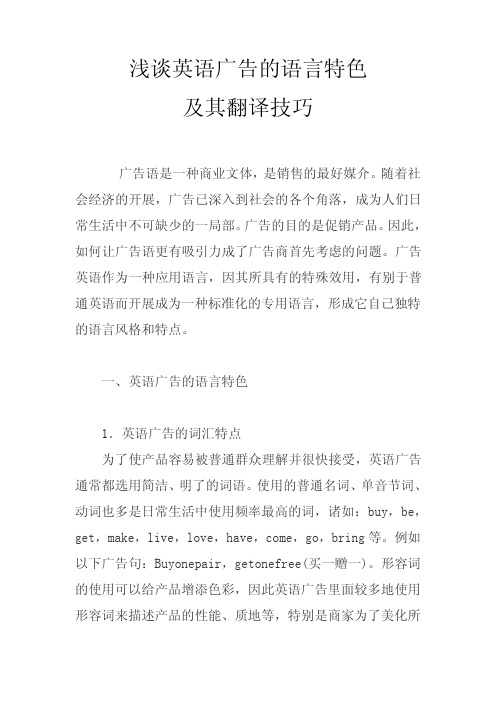广告英语的语言特点--商务英语本科学位论文
- 格式:doc
- 大小:72.50 KB
- 文档页数:21

英文广告语言的特点浅谈论文[关键词]英文广告语言句式词汇修辞引言“广告”来源于advertere一词,解释为“唤起群众对事物的留意并引导其向某种方向进展所采纳的方法”。
其首要任务是“意图是把某种商品或者服务投放市场,到达肯定的经济利益的目的。
”[2]广告作为商业的产物,以多样的形式影响着人们的生产生活,但是随着商品市场的进展,产品多样性越来越明显,竞争不断增添,广告所附载的单纯地推销功能并不能到达推广产品的目的,也越来越不能满意人们对附加在广告上美学和艺术的需求。
可见,广告已经从单纯以营销推销为目的的手段渐渐演化,时至今日,为了吸引人们留意并到达推广公司形象及增添产品关注度的目的,广告已经渐渐迎合人们日益增长的艺术水平和文化要求,变成一种高品位的艺术策划行为。
因此,杰出的'英文广告,在英文用词、句式、修辞等方面具有很鲜亮的特点。
一、英语广告的句法特点(一)简洁句在英文广告中,简短明快的简洁句更简单引起读者留意,可以更加有效地传达广告中的信息。
此类英文广告,用句口语化,具有可读性和便于理解和记忆,能够更好地影响和打动消费者。
例 1.A diamond lasts forever.(De Bierres)钻石恒久远,一颗永流传。
(第比尔斯)例2.Probably the best beer in the world.(carsberg)可能是世界上最好的啤酒。
(嘉士伯)在英文广告中,简洁的陈述句可以把广告的核心内容表达清晰,朴实直观,简单记忆。
(二)祈使句祈使句在英文广告中的应用特别广泛,信息输出简洁直接,尤如与消费者面对面沟通和沟通,引起读者共鸣并具有很强的煽动性。
例1.Obey your thirst.听从你的渴望。
(雪碧)例2.Take time to indulge.尽情享受吧!(雀巢冰激凌)(三)否认句在英文广告中,否认句的使用标新立异,利用逆向思维,通过与其他同类产品的对比或者逆向反衬本产品特性,到达宣扬的经济效果和艺术效果。

广告英语的语言特色浅析【摘要】广告英语作为一种特殊的文体,有独特的词汇、句法、修辞等语言特色。
【关键词】广告英语;语言特色;修辞广告语是一种商业文体,是销售的最好媒介。
广告的目的是促销产品,因此,如何让广告语更有吸引力成了广告商首先考虑的问题。
广告英语作为广告信息编码的一种应用文体,已逐渐从普通语言家族中脱颖而出,形成一种相对独立的、独具特色的应用性语言。
因其所具有的特殊效用,有别于普通英语而发展成为一种规范化的专用语言,形成它自己独特的语言风格和特点。
一、词汇特色为了吸引广大用户,使广告更具宣传效果,广告英语大量使用带有褒义色彩的形容词、富有动感的单音节动词,以及创造大量的新词和使用外来词语等。
广告英语词汇有别于普通英语,有其独到之处。
其词汇特色主要体现在以下几个方面:1.频用动词广告的最终目的是促使消费者采取购买行动,因此广告中常常使用动词来表达敦促之意。
使用频率较高的动词有:have,give,make,need, come,get,use,take,try,go,look,choose,buy,love,bring等。
这些词汇大都是日常口语中常用的单音节动词,它们在广告中的运用,符合广告语言简练通俗、轻松活泼的特点。
如:take toshba,take the world. (东芝电子广告)。
buy onepair,get one free. (买一赠一)。
buy和get是两个简单的单音节动词,直截了当地将广告商与消费者之间的双边活动表现出来。
一方面反映了广告商的诚意,另一方面使消费者产生简单、快捷、实惠的感觉,从而增添了买卖关系的可信度。
2.巧用形容词为了推销产品,描述产品的性能和品质,对产品进行美化和粉饰,广告中经常大量使用具有积极肯定意义的、褒义色彩浓厚的评价性形容词或形容词的比较级和最高级,以突出推销的产品优越于同类的或以往的商品。
常见的形容词:good,new,easy,bright,delicious,full.sure,special,wonderful,great等。

广告英语的语言特点韩 晔(榆林学院外语系,陕西榆林719000) 摘 要:广告英语是一种商业用语,与普通英语有着较大差别,主要体现在词语的运用、句子的构造和修辞的手段方面。
文章结合大量实例,着重从广告英语的词法,句法和修辞三方面来探析广告英语的语言特点。
关键词:广告英语;词法;句法中图分类号:G 314 文献标识码:A 文章编号:1008—3871(2008)05-0103-02 在经济全球化的背景下,借助多样传媒的力量,广告英语也进入了我们的日常生活。
广告英语,作为一种商业性语言,已逐渐从普通语言家族中脱颖而出,形成一种相对独立的独具特色的应用性语言。
它以简单的语言表达出复杂的意义,有其独特的语言魅力,是一种具有很高实用价值的实用文体。
广告英语因其用词的优美独到,句法洗炼,内容丰富及其巨大的感召力和说服力逐渐从普通英语中脱颖而出而发展成非规范化的专用语言,引起了人们的极大兴趣。
对于英语学习者而言,了解并掌握广告英语对于我们英语水平的提高是十分必要的。
一、词法特点一般说来,广告英语经常使用简单、具有口语化倾向的词以及一些新造词来使广告英语行文简单、生动、形象和富有感染力,具体表现在:1、广告用语用词简单,通俗易懂。
如:(1)O ncetasted ,al w ays loved .(一旦品尝,爱之终生。
)行文浅显易懂,简洁明了,却能引起顾客对此食品垂涎三尺。
(2)M y goodness !M y Gu inness !(我的天啦!啤酒!)通俗的语言,容易上口,道出了饮用(Gu inness )啤酒时赞不绝口的情景。
2、模拟生造新词。
在词的运用中,广告英语的另一个重要特点就是创造新词,广告英语中创造新词的原则大致如下:一是巧妙运用英语的前后缀或合成词中各部分的含义,使语义变得生动活泼;二是创造一些合成词,将本来要一句话来表达的意思用合成的词语来表示;三是巧用语言规则故意将某些词按语音写成新的拼写方式,新造词使语言变的生动活泼,引起读者的感知而达到促销的目的。

浅谈英语广告的语言特色及其翻译技巧广告语是一种商业文体,是销售的最好媒介。
随着社会经济的开展,广告已深入到社会的各个角落,成为人们日常生活中不可缺少的一局部。
广告的目的是促销产品。
因此,如何让广告语更有吸引力成了广告商首先考虑的问题。
广告英语作为一种应用语言,因其所具有的特殊效用,有别于普通英语而开展成为一种标准化的专用语言,形成它自己独特的语言风格和特点。
一、英语广告的语言特色1.英语广告的词汇特点为了使产品容易被普通群众理解并很快接受,英语广告通常都选用简洁、明了的词语。
使用的普通名词、单音节词、动词也多是日常生活中使用频率最高的词,诸如:buy,be,get,make,live,love,have,come,go,bring等。
例如以下广告句:Buyonepair,getonefree(买一赠一)。
形容词的使用可以给产品增添色彩,因此英语广告里面较多地使用形容词来描述产品的性能、质地等,特别是商家为了美化所述商品,加强描述性和吸引力,会采用大量的褒义形容词,或用形容词的比拟级和最高级与其它产品进行比拟,来抬高和突出自己的商品,增强消费者的购置信心。
例如: 珠宝广告:Shangha's first pearl dealer;Highestquality pearls with a widest selection of classic &creative designs;Excellent after-sales service;Fairprice to every customer本例广告中使用了first,Highest,widest等多个褒义形容词,非常具有吸引力。
有时候也通过成心使用错别字、杜撰新词或错乱搭配来拼造一些新词怪语,以满足消费者追求新潮、标榜个性的心理,起到意想不到的修辞效果。
钓鱼广告:What can be delisher than fisher?delisher 是指delicious之音杜撰出来的,目的是与后面的fisher造成押韵的效果,突出钓鱼的乐趣。

浅析广告英语的语言特征及翻译技巧_英语论文广告语言本身就充满丰富的想象力和极大的创造性,下面是小编搜集整理的一篇研究英语广告的语言特征的论文范文,供阅读借鉴。
摘要:广告在国际市场竞争中十分重要。
广告翻译愈来愈成为外贸活动中的一项重要内容。
该文从词法、句法及修辞手法三方面介绍了英语广告的语言特征,并通过实例分析阐述了常用的几种翻译技巧。
关键词:英语广告;语言特征;翻译技巧广告是一种公众性的信息交流活动,它以付费的方式通过报刊、电视、广播等向公众介绍产品、服务或观念,对一项产品的推广起着极其重要的作用。
广告不仅是一种经济活动,而且是传播文化的主要媒介。
广告的目的是引导消费者进入丰富多彩的商品世界,激发他们的兴趣,促使他们在接触到广告之后就能产生强烈的购买欲,进而实现消费者由Attention(注意)—Interest(兴趣)—Desire(欲望)—Action(行动)的逐渐转变。
当今随着全球经济一体化进程的加快和我国对外开放的进一步扩大,国际间的商品流通日益频繁。
在参与国际市场竞争时,国内外厂家都面临同一个问题,即如何将自己的产品更好地介绍给目标市场的消费者。
其中一个不可忽视的环节就是充分利用好广告,为厂家赢得应有的利益。
由此可见,广告的重要性越来越突出。
本文拟通过一些具体实例分析,就英语广告的语言特征及其翻译技巧作一粗浅的探讨。
1.英语广告的语言特征广告是一种竞争性的商业行为。
广告除了有帮助消费者认识商品的作用外,还有诱发消费者感情,引起购买欲望,促进消费行动的心理功能,以及给消费者以美感享受的美学功能。
这也是广告的唯一目的。
为了达到这一目的,英语广告往往具有如下特征。
⒈1词汇方面①大量使用具有褒义色彩的形容词及其比较级和最高级。
为了美化产品,吸引顾客,广告中大量使用有褒义色彩的评价性形容词以及形容词的比较级和最高级来增强广告的魅力。
例1:Excellent daily specials and mouthwatering desserts.例2:For the first time, there’s a remarkable gel that can give your hair any look you want----sleeker, fuller, straighter, curlier, more natural, even wet---without a drop of alcohol or oil.例1是一则餐厅广告,形容词占了整个广告字数的一半,极具诱惑。

随着我国经济体制改革的深入和社会主义市场经济的确立与发展 对外经济交往日益频繁 出口广告逐渐发展成为企业促进出口销售、开拓海外市场的一个主要手段。
相应地,外国广告的大量涌入也使之成为我国企业和消费者获取商品经济信息的重要来源。
如何恰如其分地运用和理解广告英语以实现广告的目的,已是摆在进出口商、广告人员及广大消费者面前的一个现实问题。
广告英语文体的语言特点1.广告英语的词汇特点广告英语的词汇丰富多彩,但每一个词的选择与使用都服务于“推销商品”这一最终目的,因此它们往往具备鼓动性和感染力。
归纳起来主要表现如下:●形容词及其比较级、最高级的使用。
例如:Famous world-wide gourmet cuisine.Excellent daily specials and mouthwatering desserts.(世界著名的美食烹调。
精美的美日特色饭菜和令人垂涎的点心。
)Tasters richer…… mellower……more satisfying.(口味更浓……更醇……更令人满意。
)●创造新词、怪词以引起新奇感,突出产品的新、奇、特,满足消费者追求新潮、标榜个性的心理。
例如:For twogether the ultimate all inclusive one price sunkissed holiday.(两人共度一个阳光灿烂的假日,一切费用均包括在单人价格之内。
)twogether 取自together之音,又取“两人”之意比together更形象,倍添情趣。
●词汇的重复。
词汇的重复是一种常用的技巧,可以起强调、渲染的作用,而这恰恰是广告语言所要追求的效果。
例如:Easy to use easy to clean easy to a s semble. 日光牌简便烧烤架广告●使用缩略词和复合词以节省广告篇幅。
广告写作中常尽可能缩短篇幅,以降低成本。
缩略词和复合词的使用比比皆是。
浅谈广告英语的语言特点【摘要】广告英语作为营销领域的重要组成部分,具有其独特的语言特点。
本文从广告英语的简洁性、吸引力、情感性、独特性和创新性五个方面展开详细探讨。
简洁的语言能够直击消费者,吸引他们的关注;吸引力则是广告成功的关键,能够有效吸引目标群体的眼球;情感性则是通过情感共鸣来影响消费者的购买决策;独特性和创新性则是让广告脱颖而出的关键,让消费者对其留下深刻印象。
广告英语在营销中的重要性不言而喻,而对其进一步研究能够帮助我们更好地理解消费者心理和行为,提高广告效果。
总结而言,广告英语的语言特点在当今商业社会中扮演着不可忽视的角色,其研究也具有深远的意义。
【关键词】广告英语、语言特点、简洁性、吸引力、情感性、独特性、创新性、营销、研究、进一步研究、总结、重要性、广告、英语.1. 引言1.1 研究背景广告英语的简洁性、吸引力、情感性、独特性和创新性是其独特的语言特点。
通过对这些特点的分析和研究,可以更好地理解广告英语的运用规律,指导广告创意的制作和传播策略的制定。
深入研究广告英语的语言特点,可以为广告语言的进一步发展提供参考和借鉴,促进广告行业的不断创新和发展。
本文旨在探讨广告英语的语言特点,揭示其在广告传播中的重要作用,并展望未来对广告英语的进一步研究方向。
1.2 研究目的研究目的是为了深入探讨广告英语的语言特点,分析其在广告营销中的重要作用,揭示其对消费者的影响力和吸引力。
通过研究广告英语的简洁性、吸引力、情感性、独特性和创新性,可以更好地了解广告语言的运用技巧和特色,为广告从业人员提供有效的营销策略和方法,为消费者提供更具吸引力和感染力的广告内容,从而促进商品的销售和品牌的传播。
通过对广告英语的深入研究,可以为未来的广告语言创作和营销策略提供新的思路和方向,同时也有助于提高消费者对广告的理解和接受程度,增强广告的传播效果和影响力。
本研究旨在全面分析广告英语的语言特点,揭示其对广告营销的重要意义,为广告语言的创新和发展提供理论支持和实践指导。
毕业论文标题:浅谈商务英语广告文体特征及语言特点系别:专业:学号:姓名:指导教师:二○一○年十二月十日摘要当前,随着我国社会主义市场经济体制的日臻成熟,我国融入国际社会和参与国际竞争的步伐日益加快,我国城乡居民生活品质的不断提高,广告,尤其是英语广告映入人们眼帘的频率越来越高,各行各业为宣传、推广、促销自己的产品无一例外地利用广告的无穷魅力渗透到人们生活的各个层面,激发消费者的兴趣并唤起购买的欲望。
本文试图通过实例分析总结对英语广告文体特征和语言特点进行探讨。
关键词:英语广告;文体特征;语言特点目录摘要 (II)目录 (III)引言 (1)1广告含义及作用 (1)1.1广告定义 (1)1.2广告作用 (1)2商务英语广告的文体特征 (2)2.1简洁精练 (2)2.2明白易懂 (3)2.3朗朗上口 (3)2.4主题突出 (4)2.5生动形象 (4)3商务英语广告的语言特点 (4)3.1词汇特点 (4)3.2句法特点 (5)3.3修辞特点 (6)结束语 (7)致谢 (8)参考文献 (9)浅谈商务英语广告文体特征及语言特点引言随着国际分工的深化、发展和全球经济一体化的趋势日益加强,国际间的商品流通日益频繁,各个国家为了争夺世界市场,竞相推销本国产品。
因此尤其是英语广告,日益盛行了起来。
在商品经济繁荣、信息充斥的今天,广告已经渗透到生活的每一个角落,成为人们生活中不可缺少的组成部分。
广告英语,作为广告信息编码的一种应用文体,已逐渐从普通语言家族中脱颖而出,形成一种相对独立的独具特色的应用性语言。
它同文学语言、科技语言或书面语言相比有许多不同之处。
广告语言,运用各类语言形式来体现其语言的新颖、多样、生动和形象。
探究广告文体特征及语言特点,具有重要的意义。
1广告含义及作用1.1广告定义广告,是为了某种特定的需要,通过一定形式的媒介物,公开而广泛地向社会传递信息的一种宣传手段。
广告有广义和狭义之分,广义广告包括非经济广告和经济广告。
论广告英语的语言特色随着我国对外经济交往的迅速扩大,商品广告也逐步发展成为企业促进出口销售、开拓海外市场的一个主要手段。
厂家依赖广告推销产品,开拓市场,顾客依赖广告进行消费。
广告是发展经济的催化剂,是架构产、供销的纽带和桥梁。
广告具有鲜明的目的性,即说服顾客进行购买,这种目的性决定了其独特的语言风格。
尽管好的产品,根于好的广告,但广告的说明力和诱惑力是通过语言的锤炼实现的。
广告语言是一门浓缩的艺术化商业语言,精辟的语言能使顾客耳目一新。
许多精彩的广告经反复推敲斟酌而成,往往匠心别具,字字珠玑,句法简练且内容丰富,具有很高的商业价值和美学欣赏价值。
欣赏精彩的英文广告,从英语广告中学习语言也是我们窥见英语语言精妙的一大捷径。
本文通过对大量英语广告实例进行分析,就以下几个方面对现代商业广告英语的语言特色展开讨论。
一、创造新词,增强吸引力广告的创造过程中,新词的创造占了很大的比例。
通过单词重组,使所构成的新词既不失原味又增添新意,还将广告主题表达得淋漓尽致,从而达到意想不到的效果。
广告的新词创新大致有三种情况:一是广告创作人员故意把某些大家所熟悉的字或词拼错(misspelling),比如:★The Orangemostest Drink in the whole world.这是一则饮料广告,“Orangemostest”实际等于“Orange most est ”,“mos”与“est”都表示形容词最高级的词,在这里与“Orange”连用,借以表现这种橙汁饮料的高质量、高纯度、高……,它出乎意料地演绎了这个词,将其转换为一个形容词,而且还与“most”形成了最高级形式,给人以丰富的想象力。
再比如:二是巧妙地运用英语中前后缀重组,使词语变得生动活泼。
如: “ex”这个后缀来源于“excellent”。
广告用语中加了这个后缀后可以暗指货物的质量十分出色。
如:“Kleenex”(一种可以替代手帕的柔软薄纸), “Latex”(一种泡沫床垫), “Cutex ”(一种指甲油),“Rolex”(手表商标)等。
浅谈广告英语的语言特点
广告英语是商业广告中使用的一种语言,它具有以下的几个语言特点。
首先,广告英语具有极强的目的性。
广告英语是一种有目的的语言,它的主要目的就是要激发消费者购买产品或服务,因此,广告英语在语言表达上都尽可能地简短明了,让人容易理解和接受,同时也非常具有吸引力和感染力,能够吸引消费者的注意力,引发他们的兴趣和购买欲望。
其次,广告英语的语言表达具有强烈的感性色彩。
广告英语注重消费者的感官体验,使用大量的形象化、感性化的表达方式,将产品或服务赋予了新的美好形象,激发人们的感性需求和购买欲。
在广告英语中,常常使用各种修辞手法,如比喻、拟人、夸张、反复等,使产品或服务显得更具魅力和吸引力。
第三,广告英语的语言表达非常具有创意性和多样性。
广告英语的使用者通常是广告公司或企业,为了让自己的广告更能引人入胜,他们需要使用创意性强、多样性大的语言表达方式。
因此,广告英语中常常出现一些新奇、有趣、富有创意的语言表达,这些语言表达能够让广告更加生动有趣,更具吸引力。
最后,广告英语的语言表达还会结合具体的社会文化背景和时代特色。
不同的时代和不同的社会环境下,广告英语会采用不同的语言表达方式,以适应当时人们的感官需求和审美标准。
在现代社会中,一些新的信息与通讯技术被广泛应用于广告英语中,如视频、音频等多媒体技术,极大地丰富了广告的语言表达和表现形式。
综上所述,广告英语是商业广告中非常重要的语言形式,它既具有强烈的目的性,也非常注重感性体验,在语言表达上具有创意性和多样性,同时,也会受到当时社会文化背景和时代特色的影响。
中国某某某某学校学生毕业设计(论文)题目:广告英语的语言特点姓名:00000000班级、学号:0000000000系(部) :经济管理系专业:商务英语指导教师:0000000开题时间:2009-04-10完成时间:2009-11-082009 年11月08 日目录课题广告英语的语言特点一、课题(论文)提纲二、内容摘要三、参考文献Linguistic Characteristics of Advertising English00000Abstract: As a way of propagating and transmitting information,advertising plays a vital role in the development of society and economy. Its function can not be underestimated. Advertising English is a special applying language when it compares with others like literary and technological languages. It has become indispensable of daily life because of its particular characteristics and charm. The paper starts with briefly introducing the history, definition, classifications and functions of advertising. Then, it mainly summarizes and analyzes major linguistic characteristics of advertising English, including three aspects on morphology, syntax and rhetoric. Finally, it shows the conclusion that people can understand well if they try to learn and master the features of advertising English. The paper aims to bring some enlightenment to the understanding of advertising language and get a better demand of English.Key Words:Advertising, Advertising English, Linguistic CharacteristicsIntroductionAdvertising, just as its name implies, means publicize and transmit information in order to make everyone know. It has been gone through a rapid development.Nowadays, advertising is everywhere. It is indispensable to the economy of any country in the world. The importance of advertising in individual countriesdepends on the nation’s level of development and national attitude toward promotion. Typically, advertising expenditures are higher in countries with higher personal incomes. And in the process of globalization, there were a lot of trades done among countries and there will be even more in the future. During the introducing and trading processes, people gradually realized the importance of understanding of each other’s advertising language. Since then people began trying to know about its functions, nature, characteristics and so on. They did lots of study on it. As time goes by, advertising English became popular since it owns most speakers. Until now, advertising English is still the research target.1. An Introduction to Advertising1.1 History of AdvertisementAdvertisement emerged from the womb of commodity production and exchange. The condition for the existence of advertising is "at least a segment of the population must live above the subsistence level". When this situation occurs it also becomes necessary for "the producers of materially 'unnecessary' goods to do something to make people want to acquire their commodities."The embryonic form of advertising in the world is street cries, which exist even today. Advertising was not unknown in ancientGreece and Rome, but advertising as we recognize it did not start until the seventeenth century in the West. It was at about this time that newspaper began to circulate. Before that, it is printing which was first invented in China and then introduced to the West that played a vital role in the production of print advertising. "Classified" (small ads) types of advertising were dominant before the nineteenth century and style and language used in ads at that time tended to be direct and informative. The industrial Revolution, which began in England in the mid-1700s and reached the United States by the early 1800s, facilitated mass-production of goods. Meanwhile advertising became more and more important in the industrial market. The great breakthrough for advertising came only in the late nineteenth century. Technology and mass-production techniques were then sufficiently developed for more firms to be able to turn out products of roughly the same quality and at roughly the same price. This brought on a crisis of over-production and under consumption which meant that the market needed to be stimulated by advertising. At this time advertising changed its function from proclamation to persuasion. In the twentieth century, advertising developed rapidly alongside the advent of new media-radio and television in succession.1.2 Definitions of AdvertisingAfter a brief introduction of the classifications and roles of advertising, we now come to the definitions of advertising. From different perspectives or purposes, the definitions might also vary. In English, the word "advertise" has its origin in "advertere" in Latin, meaning "to inform somebody of something", "to bring into notice" or "to draw attention to something", etc. In Chinese, the equivalent term "guanggao" means "widely announce".1.3 Classifications of AdvertisingAdvertising may be classified by medium (newspaper, magazine, radio, television). By target audience (consumer, industrial, business),by geography (international, national, regional, local), or by its function or purpose (product or non-product, commercial or noncommercial, primary demand or selective demand, direct action or indirect action).Because it is difficult to gain access to enough date for English commercials and ads on radio or TV, thus, the subject of this research paper will mainly concentrate on the print advertising.1.4 Roles of AdvertisingAn advertiser's main purpose is to present and exhibit product or service, and to spread the influence and coverage of which to the extent that the potential purchasing population becomes real and actual. Simply put, advertisers try by the various means at theirdisposal to get people to buy the product or service advertised. Moreover, advertisers want potential purchasers to consider what is advertised to the exclusion of all other similar products or services. They therefore attempt to construct an advertisement that will fully involve the attention of the potential purchaser and which will have a persuasive effect. Advertisers thus create a semiotic world in order to persuade their audience of essential "rightness" of purchasing the product or service advertised.2. Linguistic Characteristics of Advertising EnglishThe wide use of advertising has created a special style of English—advertising English. Its unique features, simple language and immense attraction separate it from other kind of language. In the development of advertising English, this kind of language has formed its own features in several aspects. And there is no doubt that cosmetic advertising English has its own linguistic characteristics as well. In this paper, three main aspects will be illustrated, namely, lexical features, features of its syntax and rhetorical features.As a means to disseminate information and make people see and remember it, advertising English must be compact, vivid, visual, emotional and attractive. To realize this aim, the choice of words is playing a vital role. Therefore, morphology in advertising is quiteimportant and is different from other styles of English. It owns apparent features. The major four of them will be described in the following.2.1 More Verbs in AdvertisingVerb is widely used in advertising English, especially monosyllable ones. Advertising are no exception. Words such as get, make, give, like, love, buy, need, use are frequently used. Advertising English language needs to be simple, easy to understand, easy to remember and easy to read. Monosyllable verb boasts all these features. In daily life, monosyllable verb is the one that people most often used and also the one usually has most definite meaning. However, advertisers should pay attention to the grammatical changes of these basic verbs and know the differences between them. Most of the words can show the relation between the consumers the product. Following I will show some examples for a better understanding.Moisturewear Make-up. It gives life to the look and feel of your skin.Moisturewear Blush. It brings radiance to the look of your skin.These two lines come from Cover Girl, American cosmetic brand. It is the leading color make-ups in America. It was created by Dr. George A. Bunting, a creative enterpriser, in 1961. It is nowvery popular all over the world. Here, the verb “give”and “bring”are used.In the first line, “give life to the look and feel of your skin”is pretty attractive to females. Good look and young skin are always the things that female pursue. “Give”them that of course will make this product end up with big sale.Similarly, the word “bring”is also very appropriate. Radiance of skin is the thing that almost every woman wants and needs. If a kind of product can bring them this precious thing, they will be strongly attractive to. It will become popular.There is a great deal of other instances that wonderfully used verbs in advertising English. It is a functional way to use more proper verbs.2.2 More Adjectives in AdvertisingThe purpose of advertising is to publicize products. So it is indispensible to describe many aspects of the product such as size, color, nature, and quality. During this process, adjective plays a vital role. We can see lots of adjectives. Besides, if advertisers want to provoke the purchasing desire of the consumers’, they must make the advertisement lines imaginable, vivid and hold special appeals. And in order to do so, plenty of modifiers must be put in. All in all, a grate deal of modifiers should be used and can be seenin advertisements.Jewelry advertisements: Shanghai’s first pearl dealer;Highest quality pearls with a widest selection of classic &creative designs;Excellent after-sales service;Fair price to every customer. This example uses first,Highest,widest in the advertisement, etc Bao Yi adjectives extremely attractive. Sometimes also used by deliberately fabricates word or words, some confusion to spell words collocation of strange language, in order to meet consumers' pursuit of trendy, flaunt personality, psychological unexpected rhetorical effect.Fishing advertising: What can be delisher than fisher? delisher Refers to the voice of delicious invented, the purpose of which is caused by the fisher behind with rhyming effect, Outstanding fishing .To sum up, more and appropriate adjectives are indispensible and helpful in advertising English.2.3 More Abbreviations and Compounds in AdvertisingThere are also many abbreviations chosen in advertising English. Nowadays, the cost of advertising is particularly high. Space is money and that is to say every word is money. What is more, abbreviations make advertisement less boring but more interesting. Therefore, it is necessary to use them in advertising.For example, advertisers use ‘em to replace “them”; ‘tis to replace “this”; ‘n in stead of “and”and so on and so forth.What is more, in advertising English, copywriters use a lot of compounds. People almost can see them everywhere. Because the components of a compound can be any kind of word. It is not limited by the order of English syntax. Comparatively, it is more flexible and creative. Therefore, advertisers can make full use of advantages of compounds. As time goes by, it makes the usage of compounds one of characteristics of advertising English.The example is given as following:“Light-Diffusing makeup SPF8”this is one good example. Light-Diffusing means this product can disperse sunlight so as to protect skin from sun burnt. This is the purpose of sunlight proof products. Therefore, the advertising not only can soon attracts people, but also directly hit the need of consumers.Last but not least, there are many other kinds of compounds like compound adjectives and compound verbs. If they are appropriately used, amazing effects will come along.2.4 More Simple and Colloquial Words in AdvertisingIn advertising English, we can see most of words used are very simple. They are easy to understand and remember. For the aim ofadvertising is make everybody know, the words used of course should be easy. And if advertisers want every witness to remember this piece of advertisement, the words should be comparably colloquial and daily-used. After seeing an advertisement, people usually can remember it and tell others, relatives, friends and so on. So just for a little while, a lot of people will know.Let us see a instance as following:“Who does your hair? I do it myself”This is a line of publicize a kind of hair jelly. We can see this is very simple like a daily talk. The words “who”“do”and “your”are very common words. Everybody use them a lot. I am sure this advertisement can be heard and remembered very soon. Thus, the target product is sure to be popular and become a good seller.3. English Syntax in AdvertisingThe structure of advertising sentence should be the same as that of other styles. It is comparably complete and independent language unit. It has certain grammar structure, phonetic structure and meaningful vocabularies. However, first of all, copywriters need to consider consumers’thoughts so as to make every piece of advertisement is eye-catching. Describe the merits of products, causing buying interest. Then can they get people’s action of purchasing. Therefore, for all these reasons, advertising Englishhas its particular characteristics on syntax.3.1 Wide Use of Simple and Colloquial Sentences, with less complex sentences.Widely use of simple and oral sentences is very important in advertising. They are easy to understand and easy to remember as well. Advertisement is facing everyone person. Anybody might be the customer. So it requires that each sentence appeared in advertising must easy, brief and make sure almost everyone can understand and remember without efforts. Then it may catch the eyes and ears of consumers’so as to make them interest in the product. In opposite, long and complicated sentences are usually boring and difficult. Besides colloquial language is natural and make people feel comfortable. It is more acceptable.What is more, there is another reason why advertising adopt this strategy. It is the cost. The fee of making advertisements is quite high. In order to cut down the cost, they need to use as less phrases as possible. Therefore copywriters are demanded to transmit as much information as possible thought the minimum space and sentences. As time goes by, more simple and colloquial sentences become one of vital features of advertising English. (1) Going East. Staying Westin. (到东方,住Westin宾馆)This is a very clever design in hotel advertisements, , two singlepart ,no subject-predicate structure, the word is symmetrical, compact and lively.“Westin”is hotel name, and is reminiscent of East and West of the corresponding.(2)Our finest time. (共度美好时光)A couple of drinks, and this is how the world famous of romantic emotional appeal, make sentences with phrases for advertising, refined wine, fascinating.Advertisements must with least layout, the most refined language, to deliver the most information, most effectively arouse readers' desire to buy. Advertising English, so as the single department, simple sentences, and avoid to use complex compound sentence3.2 More Interrogative and Imperative SentencesAccording to an incomplete statistics, we can see one interrogative sentence in every 30 sentences and one imperative sentence in every four sentences in advertisement. Why does this happen? It mostly relies on the two important features of advertising which are attention-catching value and memorizing value.Interrogative sentence is widely used in advertising English. It aims to make consumers think and stand on the same side of the advertisers. Copywriters purposely put themselves in consumers’shoes and put forward questions that consumers care about. Sometimes one question and one answer followed. And sometimes there is no answer. On this occasion, consumers are usually interested in coming up an answer. That is to it is easy to catch attention by using interrogative sentences. Besides, it also can establish kinder of harmonious relationship between consumers and products. Let us see some instances as followed:Who does your hair?I do it myself.This is an advertisement of hair wax. It is a simple interrogative sentence. But it shows amazing effect. It starts with an interrogative sentence “Who does your hair?”causing consumers’attention. Then, according to common knowledge, people usually want to know the answer when facing a question. They even begin to think and look for it. Thus, first step, advertisers win. Next, giving out the answer “I do it myself”, brief and direct. Once more, eye-catching, people love the answer. Also it is kinder of a way of inspiriting. Because this line makes consumers believe that they can run their hair well by themselves with this target product. Thus, it is sure that everyone will buy it, giving him or herself a chance. And give the product a chance as well. It is really a good idea.4 Rhetoric in Advertising EnglishRhetoric in Advertising English is based on the functions of words, sentences as an expression of the use of rhetorical skills, often determines the advertising originality and effect. rhetorical feature mainly has the following kinds.4.1 figure of speechIt can make advertising language vividly, enhance readers image thinking. Such as:(1) The born leader. (天生的领导者)This sentence hint the product is produced in leadership, Of course it is excellent products.(2)What it’s like to be small but good. (麻雀虽小,肝胆俱全。